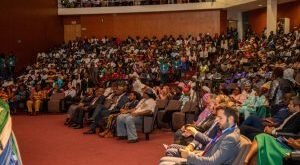The Crisis of Galamsey: A National Emergency
The rivers are dying, the farms are gasping, and the unborn are left to drink and eat from the sins of their ancestors. This is not just a local issue in Ghana; it is a national emergency that threatens the very foundation of the country’s future.
Galamsey, the illegal gold mining industry, has evolved from simple artisanal panning into a multi-billion-dollar shadow economy. Armed with heavy machinery, mercury, drones, and foreign financing, this illicit activity has expanded far beyond its original scope. It is no longer just an environmental concern—it is a crisis that is hollowing out rural economies, undermining institutions, and jeopardizing the health and well-being of future generations.
Despite numerous government initiatives such as Operation Vanguard and NAIMOS, along with thousands of arrests since 2016, the devastation continues. The machines return, the rivers darken, and the people suffer. The truth is clear: the government cannot win this war alone.
Environmental Degradation and Health Consequences
In regions like the Eastern and Western parts of Ghana, rivers such as the Birim, Pra, Ankobrah, and Offin have become channels for sludge, mercury, and cyanide. The Ghana Water Company warns that the country may soon be forced to import clean water. Craters replace cocoa farms, and cattle herders search for safe watering spots. Fishing communities net silt, and boreholes yield chemically contaminated water. When water is undrinkable and soil is infertile, no food grows, no meat survives, and no nation stands. Ghana, once a regional symbol of food and water security, is edging dangerously close to ecological insolvency.
The consequences extend beyond the environment. Across mining regions, clinics report increasing cases of mercury poisoning, respiratory illnesses, miscarriages, and neurological damage, especially among children and pregnant women. These toxins will show up in special-needs classrooms, overstretched hospitals, and across generations of poverty. Galamsey isn’t just damaging the terrain; it is quietly altering the nation’s biology.
Foreign Involvement and Local Complicity
The most painful irony is that the worst perpetrators could never commit such acts in their own countries. Foreign-backed syndicates, often better resourced than local law enforcement, violate Ghana’s environmental integrity in ways unthinkable under the laws of their own countries. But they do not operate in isolation. A network of local collaborators enables them:
- Citizens who stay silent out of fear or financial gain
- Chiefs who lease sacred land
- Security officers who turn a blind eye
- Politicians who benefit from the proceeds
These foreign actors will depart with full pockets, leaving behind poisoned wells, collapsing ecosystems, and a generation born into illness. This is not merely illegal mining; it is the commodification of Ghana’s soul, exported piece by piece for someone else’s wealth.
The Role of Citizens in Combating Galamsey
Illegality cannot be solved by the government alone. From President Kufuor’s early concerns to President Mahama’s directives and President Akufo-Addo’s vow to stake his presidency, governments have tried and continue to give it their best shot. Yet within weeks, the same sites reopen. Galamsey survives not because of a lack of law, but because it thrives in the spaces between policy and practice, protected by patronage, desperation, and silence.
The real fight lies in civic morality and collective courage. This crisis must be fought in the villages, churches, schools, and chief palaces. If just 300,000 Ghanaians (~1% of the population) mobilised as whistleblowers and community defenders, it could disrupt the criminal ecosystem.
Traditional Authority and the Need for Change
Chieftaincy remains one of Ghana’s most revered institutions. However, it is at risk of becoming irrelevant. No stool should lease ancestral land to destroy it. No palace should shield perpetrators. No elder should claim ignorance. A chief who profits from Galamsey is not preserving culture; he is auctioning it. It is time for the chieftaincy to reclaim its moral capital through custodianship of water, land, and posterity.
Economic and Global Implications
Some defend Galamsey by citing unemployment. But the trade-offs are devastating: jobs that poison workers, income that destroys forests, and gold that fuels corruption. This is not development; it is short-term cannibalism and criminality promoted by the self-serving short-termist and the ignorant as a solution to unemployment and poverty.
For Ghana, one of Africa’s largest gold producers, the implications extend beyond the environment. Investors are paying close attention. As ESG metrics increasingly influence global capital flows, Ghana risks reputational damage that could discourage responsible investors. Multinationals involved in extractives or agriculture face social licence risks if they are seen to operate near or profit from illegal activities.
The Price of Inaction
If current trends persist, Ghana may spend over US$2 billion annually on water purification by 2035. Cocoa exports could decline by 30 percent, destabilising rural economies. Mercury and cyanide exposure could spark a multibillion-dollar public health disaster. Climate resilience will vanish as forest cover erodes and river systems collapse.
A New Governance Model
Governance is not the government’s job alone; it is a shared moral contract. Teachers must teach sustainability, not silence. Religious leaders must preach stewardship, not indifference. Journalists must expose, not excuse. Chiefs must lead, not lease. Citizens must hold leaders and themselves accountable.
A new governance model—bottom-up, not top-down—is essential. Each District Assembly could host youth-led reclamation squads. Public environmental dashboards could track degradation and enforcement. Restoration funds co-financed by the state and community, monitored transparently, would ensure accountability.
Conclusion: Reclaiming a Nation from Within
This is not just a call to action; it is a call to conscience. Enough talk. Enough platitudes. Enough silence. Let the teacher speak. Let the chief act. Let the mother protest. Let the youth organise. Let the journalist expose. Let the citizenry punish.
Because the boardroom is too far. The village is too near. The river is too sacred. The land must be protected. And the time is too short. Let history not record that we watched our rivers die and lands polluted while foreign criminal syndicates and local self-centred lawbreakers thrived. Let it say that we rose not with weapons, but with will. That we reclaimed not just the land, but our dignity. That we fought not just for gold, but for Ghana. And let it be said that when the unborn child cried from the future, we answered.
 Info Malang Raya Its All About World News
Info Malang Raya Its All About World News




